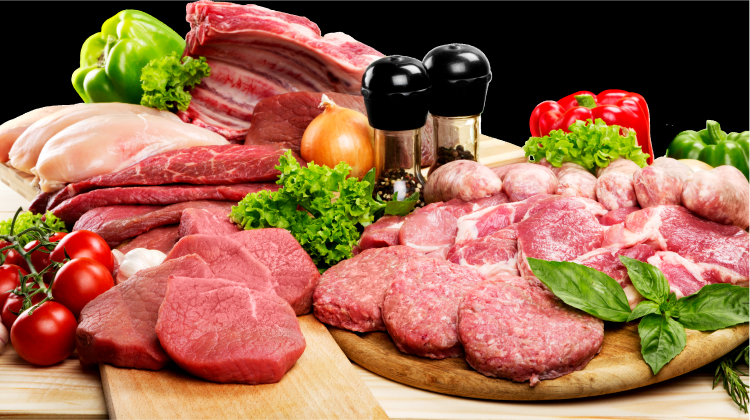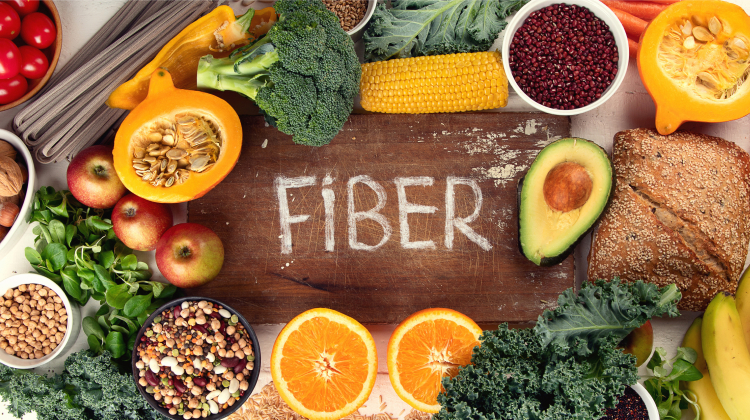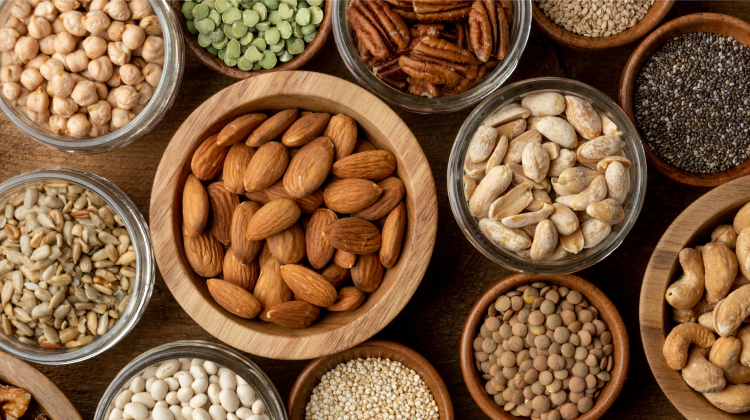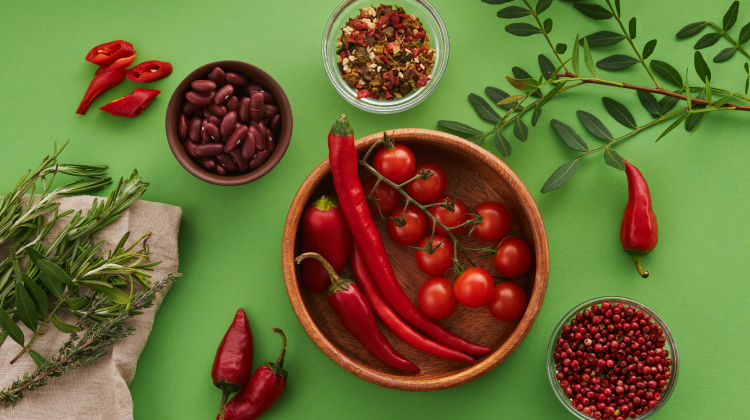8 Proven Ways To Suppress Appetite & Hunger Naturally 2024

Our bodies have excellent ways to let us know it needs to be fed and nourished. We have hormones like ghrelin and leptin that trigger us to eat or help us feel full, respectively. Sometimes we eat and may still feel unsatisfied. Hunger can be our body’s way of letting us know we are still missing either food or nutrients.
What to do when, even after eating, we still feel hungry? How can we suppress our appetites to avoid overeating? Read on to find out how.
How To Suppress Appetite Naturally
- Hydrate
- Don’t forget your protein
- Eat fiber
- Catch your zzz’s
- Caffeine
- Add nuts!
- Spice up your meal
- Chew your foods
8 Science-Backed Ways To Suppress Appetite Naturally
In the human body, hormones signal us to eat and stop eating. Sometimes we need to adjust how much we eat or cannot achieve satiety after a meal. You can do some things to help you feel full without filling your stomach too full.
Hydrate

Drinking liquids before or after a meal can help fill you up. Make sure to consume either calorie-free liquids or drink water primarily if you want to avoid additional calories. You can also drink broth or soup before meals, which can help you decrease the number of calories consumed. An additional option for hydration would be to use drinks like green tea, chamomile tea or peppermint tea, amongst other options.
Some can also confuse hunger with thirst. So make sure you are drinking enough liquids during the day to keep you hydrated. Choose sugar-free and low-sodium liquids.
Don’t Forget Your Protein

Making sure you have a food protein[1] source on your plate will help you feel full for longer. It is hypothesized that when you eat protein, levels of anorexic hormones like glucagon-like peptide-1 or GLP-1 and peptide YY, also called PYY, increase. These hormones signal you to stop feeling hungry. After eating protein, there is also a decrease in the levels of the hunger hormone ghrelin.
Mostly, high-protein[2] diets contain around 1.2-1.6 grams of protein per kilogram of weight. Choose lower-fat cuts of meats, poultry, eggs, and fish to keep your saturated fat intake low. You can also consume plant-based protein sources (lentils, beans, chickpeas, tofu) to decrease the amount of saturated fat consumed, thus decreasing your risk for heart disease[3].
You may use a protein supplement like whey protein or a plant-based protein powder. This may be useful if you need to curb a craving for sweets or need a snack that can curb hunger.
Eat Fiber

High-fiber foods like fruits, vegetables, and whole grains can have a satiating effect. It may also help you get full faster and for a longer period of time. Consuming[4] fiber-containing foods with your meal can impact satiety-modulating hormones like ghrelin, leptin, GLP-1, and PYY. Fiber stimulates gastric secretions that distend the stomach and trigger satiety.
Fiber[1] is a non-digestible food component fermented in your gut and helps keep healthy bacteria in your intestines. The bacteria in your intestines produce short-chain fatty acids. It is proposed that this process affects satiety regulation in your body, although this is not fully understood yet.
Government guidelines[5] suggest eating 14 grams of fiber per 1,000 calories for optimum digestion and health. High-fiber foods are one of the best natural appetite suppressants.
Catch Your Zzz’s

A good night’s sleep can help make sure your system works correctly. In some studies, people who sleep less tend to have an increased risk of obesity and chronic diseases. Sleeping less[6] than seven hours an evening can cause an increase in ghrelin levels, the hunger hormone. High levels of this hormone circulating in your body may increase your hunger and make it harder to achieve satiety.
It is recommended that adults[7] get more than 7 hours of sleep daily for overall good health.
Caffeine

If you are a coffee drinker, rejoice. You probably have heard that people drink coffee to stop hunger pangs. Some studies[8] show that caffeine consumed 30 minutes to four hours before a meal will help decrease food intake. Coffee is not your only caffeine-containing drink; it can also be black or green tea.
Coffee[9], in particular, can stimulate the production of cholecystokinin[10], a brain-gut peptide that is released after eating protein and fat. It stimulates the gallbladder and may have an anorexic effect, triggering satiety. It could then suppress appetite.
Add Nuts!

Nuts are a source of some good fats and fiber. Add nuts[1] to your salads or to top your yogurt or oatmeal. This can help keep you full for longer and help you prevent overeating. Eating a handful of snacks can also be a good way to put a hold on hunger cravings. Make sure to chew your nuts 20-40 times to extract their nutrients and support appetite suppression and be sure to use portion control, as nuts are high in calories and fat.
Consuming nuts may also have some potential health benefits, like improved cognition, protection from heart disease, and anti-inflammatory effects.
Spice Up Your Meal

Good news for those who like spicy foods. Foods like cayenne pepper, chili pepper, and jalapenos contain capsaicin[9], which is known to have a thermogenic effect, helping you burn more calories. A study suggests that consuming a small amount of red pepper 30 minutes before a meal may decrease the amount of food consumed.
Adding this spicy element to your meal or, if tolerated, before your meal will mainly help increase satiation. Don’t limit yourself to only peppers. Tabasco sauce also contains capsaicin, which can add flavor to your foods.
Chew Your Foods

The process of mastication can also help you eat less. Chewing your foods for longer and slower will help extract nutrients from them and help you enjoy their taste. It can also affect how much food you eat and decrease the feeling of hunger. Chewing your food well gives the hormones more time to reach the brain to signal that you are full.
Choosing solid foods[11] over liquids for your meal has an improved effect on decreasing hunger and improving satiety. It could be related due to the time mastication takes. Thus, consuming harder or chewier foods, like high-fiber foods, apples, nuts, whole grains, and broccoli, will help make sure you feel satisfied and full.
Make sure to chew your foods until they are a paste in your mouth. This process can help you achieve satiety, extract all nutrients from your foods, and assist with digestion.
Other
Eating a carbohydrate-rich breakfast[12] may increase the concentration of appetite-suppressing hormones after the next meal. A good breakfast option would be oatmeal, cold cereal, whole wheat toast, or grits. Pair it up with protein sources like eggs, milk, soy, or peanut butter.
You may also find many other recommendations to curb appetite like eating or smelling dark chocolate or following a ketogenic diet. Although there are some promising studies, data is still limited on these approaches as it relates to hunger control.
Some appetite suppressants can be found as dietary supplements. For example, glucomannan[13] a fiber from the konjac plant may be an alternative to improve satiety along with fenugreek[14] fiber. Consider using 1 gram of either fiber 30 minutes to an hour before meals. This increases feelings of fullness. Start at a lower dose of this supplement to evaluate tolerance and then increase to the recommended amount.
Some prescription appetite suppressants or “diet pills” work by mimicking hormones that suppress appetite or make you feel full faster, like insulin and GLP-1, or burning more calories. Some pharmaceutical[15] weight loss options are liraglutide, phentermine, topiramate, and semaglutide. Discuss with your medical provider if you qualify for any of these to promote weight loss.
Natural Appetite Suppressant For Weight Loss
The best way to naturally suppress appetite is by using foods and behavior modification. If you are trying to lose weight or need to change your diet for any reason which limits how much you can eat, practice mindful eating. This can help you get in touch with your hunger cues and eat only until satisfied.
Using My Healthy Plate for your meals might be the best way to control the quantity of food consumed while achieving satiety. Include on your plate a low-fat protein source, fill half your plate with vegetables, and a quarter of your plate with high-fiber starch. Don’t forget your fruits and dairy every day Eating a full meal is the best way to suppress your appetite for longer.
You can suppress your appetite without food or eating. Ways to control food cravings are chewing gum, drinking a tall glass of water, or brushing your teeth. Distracting yourself with movement can also help you forget hunger, like going on a walk or doing some chores. These can help you avoid overeating and control food cravings and your appetite.
Another technique is practicing mindfulness[16] while eating. Mindfulness will help you be aware of your thoughts, feelings, and emotions during your meal and can improve enjoyment. This practice can also help you get in tune with your satiety cues, helping you eat only what you need. Some tips to start:
- Think about where your food came from and how they were prepared. Honor your food.
- Be in tune with your food’s looks, tastes, and smells. Take your time tasting your foods and their textures in your mouth. Use all your senses.
- Eat slowly. Stop eating when you feel satisfied or around 80% full.
- Express your gratitude for the meal.
Finally, do not forget that these techniques are not foolproof. These recommendations may not work for everybody and require some time for you to get used to eating less. Be patient with your body and yourself.
The Bottom Line
There are many ways we can induce satiety. Suppressing those annoying hunger hormones by planning our meals to include high-fiber whole grains, fruits, and vegetables is the first step., Adding high-protein foods will also help satiety. In addition, training yourself by practicing mindful eating can assist in being more aware of your hunger and satiety cues. Hydrating yourself and sleeping more than 7 hours can also prevent excessive appetite.
When choosing a way of reducing hunger, pick one that is right for you. Think about which one is convenient, adequate for your body and consistent with your goals. And feel free to use more than one technique.
+ 16 sources
Health Canal avoids using tertiary references. We have strict sourcing guidelines and rely on peer-reviewed studies, academic researches from medical associations and institutions. To ensure the accuracy of articles in Health Canal, you can read more about the editorial process here
- Rebello, C.J., Liu, A.G., Greenway, F.L. and Dhurandhar, N.V. (2013). Dietary Strategies to Increase Satiety. Advances in Food and Nutrition Research, [online] pp.105–182. doi:10.1016/b978-0-12-410540-9.00003-x.
- Leidy, H.J., Clifton, P.M., Astrup, A., Wycherley, T.P., Westerterp-Plantenga, M.S., Luscombe-Marsh, N.D., Woods, S.C. and Mattes, R.D. (2015). The role of protein in weight loss and maintenance. The American Journal of Clinical Nutrition, [online] 101(6), pp.1320S1329S. doi:10.3945/ajcn.114.084038.
- The Nutrition Source. (2016). Saturated fat, regardless of type, linked with increased heart disease risk. [online] Available at: https://www.hsph.harvard.edu/nutritionsource/2016/12/19/saturated-fat-regardless-of-type-found-linked-with-increased-heart-disease-risk/.
- Efimtseva, E.A. and Chelpanova, T.I. (2021). Dietary fiber as modulators of gastrointestinal hormonal peptide secretion. Problems of Nutrition, [online] 90(4), pp.20–35. doi:10.33029/0042-8833-2021-90-4-20-35.
- Usda.gov. (2022). AskUSDA. [online] Available at: https://ask.usda.gov/s/article/How-much-dietary-fiber-should-I-eat.
- Lin, J., Jiang, Y., Wang, G., Meng, M., Zhu, Q., Mei, H., Liu, S. and Jiang, F. (2020). Associations of short sleep duration with appetite‐regulating hormones and adipokines: A systematic review and meta‐analysis. Obesity Reviews, [online] 21(11). doi:10.1111/obr.13051.
- CDC (2022). Are You Getting Enough Sleep? [online] Centers for Disease Control and Prevention. Available at: https://www.cdc.gov/sleep/features/getting-enough-sleep.html.
- International Journal of Food Sciences and Nutrition. (2017). Caffeine, coffee, and appetite control: a review. [online] Available at: https://www.tandfonline.com/doi/abs/10.1080/09637486.2017.1320537?journalCode=iijf20.
- Westerterp-Plantenga, M., Diepvens, K., Joosen, A.M.C.P., Bérubé-Parent, S. and Tremblay, A. (2006). Metabolic effects of spices, teas, and caffeine. Physiology & Behavior, [online] 89(1), pp.85–91. doi:10.1016/j.physbeh.2006.01.027.
- Sayegh, A.I. (2013). The Role of Cholecystokinin Receptors in the Short-Term Control of Food Intake. Progress in Molecular Biology and Translational Science, [online] pp.277–316. doi:10.1016/b978-0-12-386933-3.00008-x.
- Krop, E.M., Hetherington, M.M., Nekitsing, C., Miquel, S., Postelnicu, L. and Sarkar, A. (2018). Influence of oral processing on appetite and food intake – A systematic review and meta-analysis. Appetite, [online] 125, pp.253–269. doi:10.1016/j.appet.2018.01.018.
- Chowdhury, E.A., Richardson, J.D., Tsintzas, K., Thompson, D. and Betts, J.A. (2015). Carbohydrate-rich breakfast attenuates glycaemic, insulinaemic and ghrelin response to ad libitum lunch relative to morning fasting in lean adults. British Journal of Nutrition, [online] 114(1), pp.98–107. doi:10.1017/s0007114515001506.
- Keithley, J.K., Swanson, B., Mikolaitis, S.L., DeMeo, M., Zeller, J.M., Fogg, L. and Adamji, J. (2013). Safety and Efficacy of Glucomannan for Weight Loss in Overweight and Moderately Obese Adults. Journal of Obesity, [online] 2013, pp.1–7. doi:10.1155/2013/610908.
- Mathern, J.R., Raatz, S.K., Thomas, W. and Slavin, J.L. (2009). Effect of Fenugreek Fiber on Satiety, Blood Glucose and Insulin Response and Energy Intake in Obese Subjects. Phytotherapy Research, [online] 23(11), pp.1543–1548. doi:10.1002/ptr.2795.
- and, D. (2022). Prescription Medications to Treat Overweight & Obesity. [online] National Institute of Diabetes and Digestive and Kidney Diseases. Available at: https://www.niddk.nih.gov/health-information/weight-management/prescription-medications-treat-overweight-obesity.
- The Nutrition Source. (2020). Mindful Eating. [online] Available at: https://www.hsph.harvard.edu/nutritionsource/mindful-eating/.



